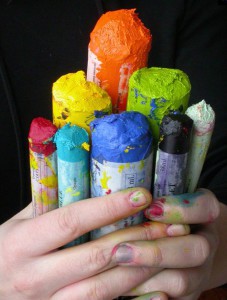Art Therapy
Art therapy is a mental health profession that uses the creative process of art-making to improve and enhance the physical, mental and emotional well-being of individuals of all ages. It is based on the belief that the creative process involved in artistic self-expression helps people to resolve conflicts and problems, develop interpersonal skills, manage behavior, reduce stress, increase self-esteem and self-awareness, and achieve insight. – American Art Therapy Association, 2010

Art therapy integrates the fields of human development, visual art (drawing, painting, sculpture, and other art forms), and the creative process with models of counseling and psychotherapy.
Have you ever wondered …
It’s not because you’re a “bad communicator.”
- And it’s not because you’re “broken” or “out of touch” with your emotions.
- It’s because certain emotions are stored in the non-verbal part of your brain.
- It can be difficult to express them in a helpful, productive way.
- Unless you have a very special set of tools.
Art is one of those tools.
 As an Art Therapist, I work with women dealing with all kinds of feelings and challenges — like anxiety, grief, trauma and depression, and everyday patterns that can make it hard to succeed or enjoy your life.
As an Art Therapist, I work with women dealing with all kinds of feelings and challenges — like anxiety, grief, trauma and depression, and everyday patterns that can make it hard to succeed or enjoy your life.
But in addition to talking about your challenges in a session, we can also use art and creativity to unlock your inner problem-solver — that powerful part of your brain that can put feelings into words, can create a plan to move forward, and cultivate more skillful ways to move forward in your life.
Art therapy is used with children, adolescents, adults, older adults, groups, and families to assess and treat the following:
- Anxiety
- Depression and other mental and emotional problems and disorders

- Family and relationship issues
- Abuse and domestic violence
- Divorce process and recovery
- Trauma and loss
- Physical, cognitive, and neurological problems; and psychosocial difficulties related to medical illness.
Art therapy is particularly effective in treatment because it does not rely on words or even conscious choices. It serves as an outlet for suppressed thoughts and feelings that would otherwise remain hidden behind the mental barrier of past traumas, heartbreak and loss often allowing a woman to increase her understanding of herself and her interactions with the people around her. Art Therapy has been shown to be a powerful tool when resolving issues around grief and trauma. Through imagery, art, dreams, and archetypal work I can help you create new ways of knowing, the ability to better express yourself and improving interpersonal relationships.

